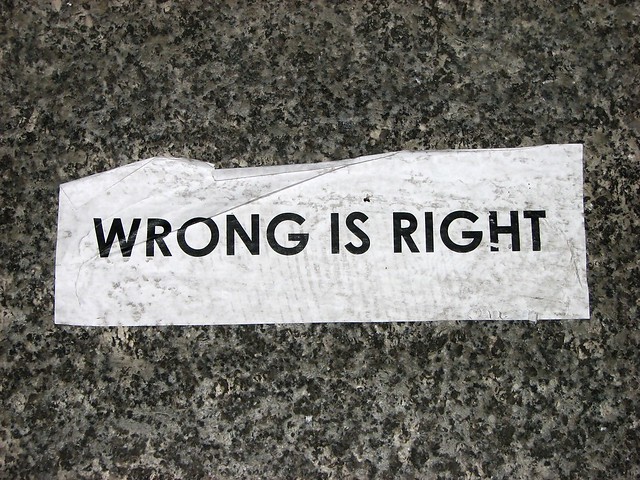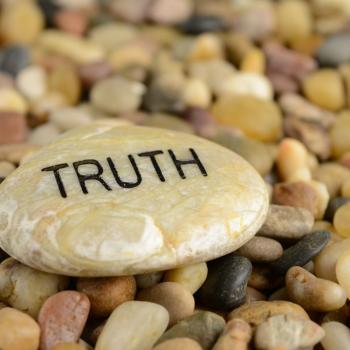
We Want to Be Right
For longer than I can remember I have been told being right is better than being wrong.
We are taught it is essential to having a happy life. In school, at home, in spiritual life, it is important. Life is about finding right answers and sharing them with other people. Our lives will be better if we make right choices and decisions.
We educate ourselves, and our children, about its power and importance. Many of us say that right makes might. We want to see ourselves as being on the right side of history. Most of us believe we need to defend our rightness with everything we have.
My experience, though, tells me there are significant advantages to being wrong.
When we are convinced we have found the correct answer, we usually stop exploring. We decide we know what is right and we work harder to defend what we know than to continue learning. When we believe we know, we tend to discourage ourselves and other people from asking questions.
Many of the greatest discoveries and innovations of our lives happen when we question what we know. We tend to learn more when ask whether we might be wrong than when we are certain we have found the answer.
Some of us know people who seem to believe spiritual life is all about knowing they are right. We hear them defend the rightness of their own ideas at the top of their electronic voices. They are convinced they have found the answer, and want us to be just as convinced they are.
For me, spiritual life is more about exploring, being wrong, and learning, than about being right. But I suppose I could be wrong about that.
Is That Your Final Answer?
Our society tells us we need to know the answer. It is easy for us to expect life to be the way our culture tells us it is.
Like a puzzle or a riddle, a detective novel or a film or television program, we expect spiritual life to be all about finding the right answer. We become impatient and frustrated when our journey toward an answer takes too long.
There is very little in our lives and our experience which helps prepare us for being wrong so many more times than we are right.
In fact, we might say we never find the final right answer when it comes to spiritual life.
We have trained ourselves to be more comfortable with finding answers than we are with asking questions. Some of us believe spiritual life is all about finding comforting reassuring answers which help us feel better.
I do not believe spiritual life is like a game show where we receive a package of amazing prizes based on our final answer. In my experience, spiritual life is much more about the journey, the path we take which is marked by our questions.
We ask, and continue asking. The questions and insights which grow in our reflection fuel our ongoing journey into spiritual life.
Sometimes we get tired and want someone to wrap us up in the soft, warm, comfortable blanket of spiritual life. Just for the night.
Our culture tells us we are consumers, and we begin to feel we have bought into spiritual life under false pretenses. Someone has pulled a bait-and-switch, and we have not received what we were promised, what we thought we bought.
It is easy for us to forget spiritual life is not a commodity we have purchased, but a relationship we have entered.
Questions and Insights in the Dark
Walking around in the daylight and the noise of everyday life it is easy for us to get distracted. It is harder to pay attention to the questions and insights in our lives because there is so much happening.
When we are not able to sleep and need to get up and sit in darkness there are fewer distractions. Darkness and stillness allow us to pay attention more effectively.
Sometimes we remember making mistakes and the lessons they have for us. There are times when remembering seems to be all we need. We remember someone or some experience from our past and are reminded about what they have taught us.
There are times when we sit in darkness getting a refresher course. At other times there are new lessons for us to explore or discover. Sometimes we sit in darkness listening to sacred stillness.
Sitting in darkness gives us opportunities to reflect and allow our questions and insights to come together.
Remembering and reflecting help us see things more clearly and decide how to put the lessons we learn into practice.
We do not need to know the final answer before we begin to take our next step.
Healing Power of Sitting in Darkness
Sitting in darkness reflecting on our insights and questions does not usually make us feel comfortable. We can be cold and lonely in the dark. Memories of actions we regret can make us feel sad or frustrated or discouraged.
We do not always feel better when we sit in the dark.
Healing comes as we begin to see what we remember in a new light. Our reflection shows us how we have learned the lessons our experiences can teach us. It is our willingness to remember and understand which allows our time in darkness to help us heal.
Neither our mistakes nor our accomplishments define who we are or who we will become.
We sit in the dark, day or night, remembering who we are and what we have done. Reflecting on our regrets from the past and our hopes for the future, we explore ourselves in the present moment.
Our conversations and arguments with ourselves run out of words.
Sitting in darkness, remembering our questions and insights, we begin to make peace with who we are.
When will we take time today to sit and reflect on our questions and insights?
How will we experience the healing power of reflecting this week?
[Image by Conanil]
Greg Richardson is a spiritual director in Southern California. He is a recovering assistant district attorney and associate university professor, and is a lay Oblate with New Camaldoli Hermitage near Big Sur, California. Greg’s email address is [email protected].
















